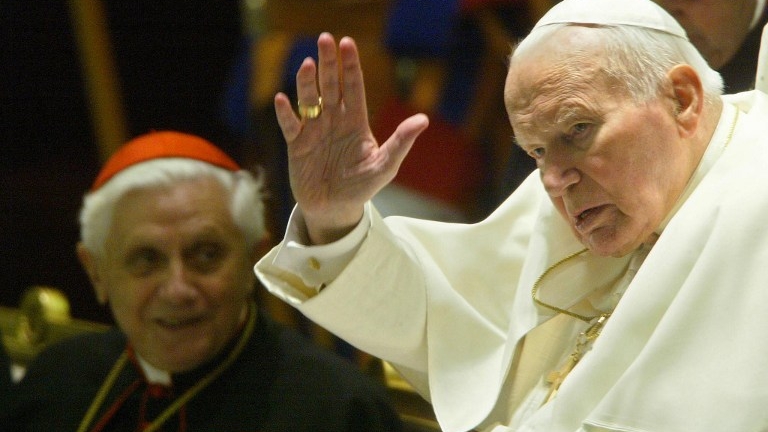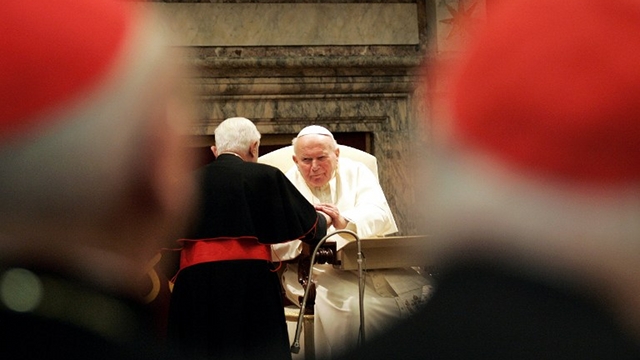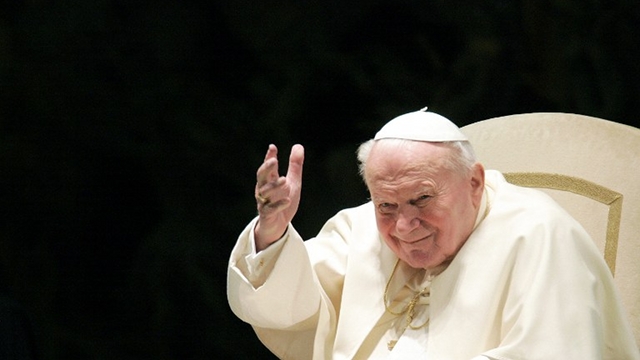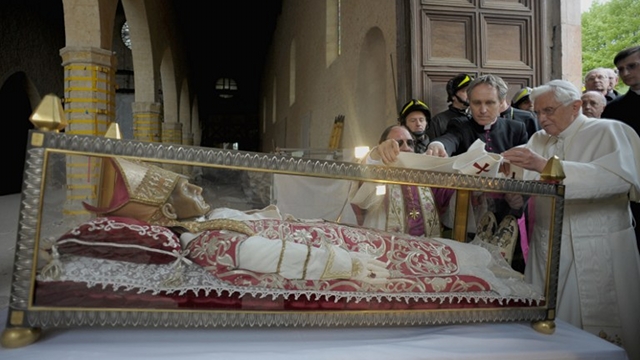SUMMARY
This is AI generated summarization, which may have errors. For context, always refer to the full article.

MANILA, Philippines – Should a pope resign? Joseph Ratzinger has dealt with this question for over two decades, consulted by no less than John Paul II.
John Paul considered retiring at 75, an ordinary bishop’s retirement age, according to the best-selling book Why He Is a Saint. The late pope asked for the advice of Ratzinger, his trusted aide, now Pope Benedict XVI.
Published in 2010, the book contains his resignation letters as compiled by Msgr Slawomir Oder, the priest leading the cause for John Paul’s sainthood.
Oder said John Paul took a possible retirement “very seriously” because of his deterioriating physical condition. “He therefore had the subject studied from both a historical and a theological point of view, consulting in particular with then-cardinal Ratzinger, prefect of the Congregation for the Doctrine of the Faith.”
The book doesn’t discuss Ratzinger’s response. Nevertheless, it says John Paul eventually abandoned the idea of a papal retirement age.

John Paul made a reservation, however. In two letters, the late pope said cardinals should consider him resigned “in case of an infirmity that is judged to be incurable and that prevents me from exercising (adequately) the duties of the Petrine ministry.”
He said the late Pope Paul VI followed the same criteria.
“This eventuality aside, I see as a grave obligation in my conscience the duty to continue to perform the duties to which Christ Our Lord has summoned me, for as long as he, in the mysterious designs of his Providence, shall wish,” John Paul said, vowing to stay on as long as he could.
Pope emeritus? No way
Oder said John Paul confirmed this decision in various instances.
In 1994, according to Oder, John Paul told surgeon Gianfranco Fineschi, who operated on him: “Doctor, both you and I have only one choice. You must heal me. And I must heal. Because there is no place in the Church for a pope emeritus.”
During the last Holy Week rites he led, John Paul responded to a cardinal “who was urging him not to strain himself excessively.”

“Jesus did not descend from the cross, why should I?” the late pope said. “I have to make it to the end.”
Oder said John Paul “serenely accepted” his deteriorating state, “as we can see from the playful way he swung his cane in front of millions of young people on the eve of the World Youth Day in Manila in January 1995.”
‘Obligation’ to resign
Five years after John Paul died, Benedict, for his part, publicly showed an openness to resign.
In his 2010 biography titled Light of the World, Benedict said: “If a pope clearly realizes that he is no longer physically, psychologically, and spiritually capable of handling the duties of his office, then he has a right and, under some circumstances, also an obligation to resign.”
In another tell-tale sign, Benedict also often visited the tomb of the 13th century saint Celestine V, the pope who issued a decree allowing pontiffs to quit. (Read: Popes who stepped down: A turbulent history.)

Benedict, however, in 2010 qualified a possible resignation.
“When the danger is great one must not run away. For that reason, now is certainly not the time to resign. Precisely at a time like this one must stand fast and endure the difficult situation. That is my view. One can resign at a peaceful moment or when one simply cannot go on. But one must not run away from danger and say that someone else should do it,” Benedict said then.
Benedict will step down on Thursday, February 28, amid sex abuse scandals and other intrigues plaguing the Catholic Church. The Vatican has repeatedly said he resigned not because of a specific illness.
‘Pope is not the Church’
In an interview with Rappler, leading theologian Fr Catalino Arevalo called Benedict’s resignation “a tremendous act of spiritual freedom and a tremendous act of courage.” He added: “I think it is a great act of a great man.”
Arevalo, who worked with Ratzinger at the Vatican’s International Theological Commission, said the Pope “is finally the only one to justify his position.”
Arevalo also said Benedict’s resignation clarifies the role of a Catholic pope. “By resigning he makes it very clear, the pope is a servant of the Church. The title that has been used for centuries – Servus Servorum Dei, the Servant of the Servants of God.”
“The Church is much bigger than the pope,” Arevalo added, “and here when the pope, as a human person, as a human being, reaches the point of inadequacy, that’s as a human being. But the Church goes on,” he said. (Watch more in the video below.)
Writing for Rappler’s Thought Leaders section, theologian Aloysius Lopez Cartagenas hailed Benedict for not waiting “for an incurable illness or serious impediment or death.”
“In doing so he is helping rescind the mystique surrounding the figure of popes in the church. Because of this mystique, according to Bishop Kevin Dowling, there is more than a perception ‘that unquestioning obedience by the faithful to the pope is required and is a sign of the ethos and fidelity of a true Catholic,’” Cartagenas wrote.
Was it right for Benedict to adopt his predecessor’s aborted plan? The world, eventually, will judge this through his act’s long-term impact. – Rappler.com
Add a comment
How does this make you feel?
There are no comments yet. Add your comment to start the conversation.